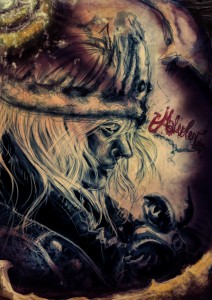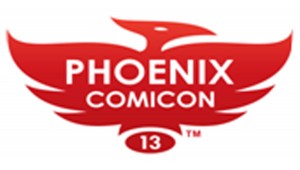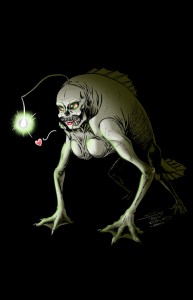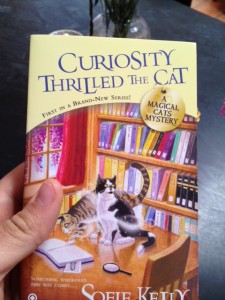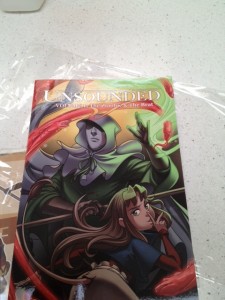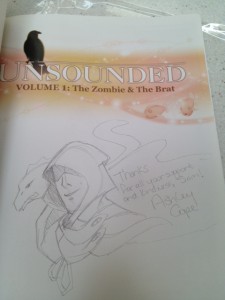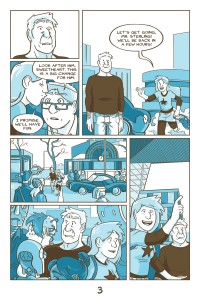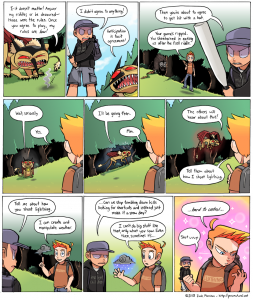Stormbeak: Book One of Wings From the South
Here’s a trick all aspiring writers should know: the closer you are to a project, the more likely you are to miss mistakes. When you’re working on a project, emotions are running high and you’re in-tune with every word being written (this is why so many criticisms often feel like personal attacks; those are your babies there). Hence, when you finish a project, before you start editing it, you should not look at it for awhile.
Such as I am doing with my latest project right now. Which is finished. Whee.
On a completely unrelated note, when you don’t look at it for awhile, it helps to have other stuff to do otherwise you get quite bored.
Hence, when my editor, Simon Spanton, tweeted this earlier…
Imagine a fantasy epic. Imagine a fantasy epic where penguins could fly! #WingsFromTheSouth
I took his advice. And I started writing.
Chapter One
We expected greatness from Stormbeak.
And why would we not? Ten eggs before him heralded nothing but greatness. Blackback, who plucked the left eye of the sea wolf. Rawthroat, who stood before the storm and stared into nothing. Longwebs, who laughed at the light-and-shadow-ghosts. Two-Fishes, who left his burdens on the far ice and returned so swift upon his belly.
Stormbeak came from greatness. We expected it from him. And he showed us he was worthy of it. He always rose to challenge everything: rival males, the sea wolves, the light-and-shadow-ghosts.
Perhaps we were the fools for not expecting that he would rise to challenge God.
Chapter Five
Long-And-Scarred was flung to the ice, staining it red beneath him. For a moment, the King of the Sea Wolves felt very close to the floe: he could feel it breaking under him, he could feel it growing colder against his skin, he could feel it slowly drifting. For a moment, he felt very fragile, indeed. A drop of blood hung over his eye as a great lid, painting the world red as he looked up. Red breath coming from his mouth. Red ice cracking beneath him. Red world rolling endlessly around him.
All except Stormbeak. He still stood so tall, still stood so proud, and still stood black and cold as long night.
“It is not right.” Long-And-Scarred hesitated in surprise. Surely, that could not be his voice that just spoke. That ragged, breathless gasp. “It is not right that I should end this way. The Great Old Ones assured me I would not die here, not by some meager fish-guzzler.”
“How were you to die, O King?” Stormbeak asked. When had his voice grown so deep? When had his eyes grown so dark? “Tell me what the Great Old Ones said.”
“They said…they said…” Long-And-Scarred swallowed something sticky and warm and very painful. “They said I would not die until the ice disappeared, until the light-and-shadow-ghosts no longer drank the sky and returned to the Cold Dark. They said I would not die until the world ended and was no more.”
“Then they were right, O King,” Stormbeak said. It was the certainty in his voice that was coldest. “Long-And-Scarred is no more. The sea wolves are laid low by the fish-guzzlers. The light-and-shadow-ghosts do not frighten me. And the sky…” He spread his flippers wide. “Embraces me.”
He flapped slowly, at first. Flakes of chipped ice wafted away, as if in terror of what he strained to do, what all his forebears’ had strained. And failed. For countless eggs. Yet Stormbeak was different. Stormbeak was strong. Stormbeak was cold. Stormbeak was no fish-guzzler. This, Long-And-Scarred knew, too late.
And when Stormbeak rose into the air–slowly, at first–and when Stormbeak sailed far overhead and when Stormbeak was but a black star on the sunrise, Long-And-Scarred still knew too late.
The Great Old Ones had been right.
The world he knew had ended.
And what remained was something red and black and very, very cold.
Chapter Sixteen
“They call you Stormbeak now?” Neoghi laughed. Or perhaps it was a shriek. Or perhaps, still, a curse. The language of the light-and-shadow-ghosts was song, and song could mean many things.
“They call me King Stormbeak now,” Stormbeak replied, puffing up proudly. His shadow spread behind him like a cloak, large enough to contain the many of his tribe who had huddled behind him. Large enough to drown them as easily as the world.
“What is a King?” Neoghi asked. He swam in a slow circle, contemplating this, his black sail cutting through the water as sure as any beak. “What is a Stormbeak? Does a King not bleed? Does a Stormbeak not die?”
Stormbeak knew much of war. In the years since he had cast Long-And-Scarred down, in the years since he had swept to the skies, in the years since he had cast the sea wolves from his kingdom, he had learned much. And he learned that challenge was courage and courage was life. Those that challenged first, had most. Those that challenged loudest, had more. Those that challenged the sea wolves, had victory. Those that challenged the light-and-shadow-ghosts, had life. And those that challenged the gods…
“No!” Stormbeak crowed. “I am the very largest! I am the very loudest! I am the very coldest! I cannot die!”
…had much to learn, indeed.
Chapter Twenty-Two
“You were not hatched a monster, Stormbeak,” Fishbelly said, dragging himself out of the rubble, rising to his webs. “You had ten eggs of your forebears’ sin to make you what you were. Ten eggs in which their darkness and coldness lingered and grew. Ten eggs for you to become what you are now.” His eye flashed. Cold. But not cold enough. “Monsters are not hatched, Stormbeak. They are made over a very long time by the gods. And like anything that is made, sometimes the gods can make mistakes.”
“Blasphemy!” Stormbeak roared.
The heaven-fire flashed behind him, a jagged bolt reaching down from a shroud–far blacker than Stormbeak’s. Was that agreement, Fishbelly wondered? Or an accusation? Did the gods reach down to condemn the hypocrisy of the one who called himself king? The one who took this world and its many sea wolves and light-and-shadow-ghosts and made it solely for the fish-guzzlers?
“Is it blasphemy to make, Stormbeak?” Fishbelly laughed, waddling closer to the Great Old Throne. “Perhaps it is. Perhaps only the gods can make. Perhaps it is blasphemy to pretend that we are they.” He looked up through his remaining eye, the eye that had once been warm, weak. “What have you made, Stormbeak?”
“Silence, Fishbelly. Return to your nest.”
“What have you made?” Fishbelly repeated. “A world without sea wolves? A world in which the light-and-shadow-ghosts are forever at our borders? A world in which eggs are broken upon the ice and females scream into the night and hear no answer?”
“Take not a step closer, Fishbelly!” Stormbeak rose into the air, carried on whatever power that drove his wings. “I warn you!”
“Then strike me down, Stormbeak. Show me who is the cruelest maker. The gods…” He spread his flippers wide. “Or you?”
And he leaned back, and he closed his eye, and he awaited the moment Stormbeak would descend upon him and pluck out his okay you know what this has gone far enough I should get back to work.
Stormbeak: Book One of Wings From the South Read More »
